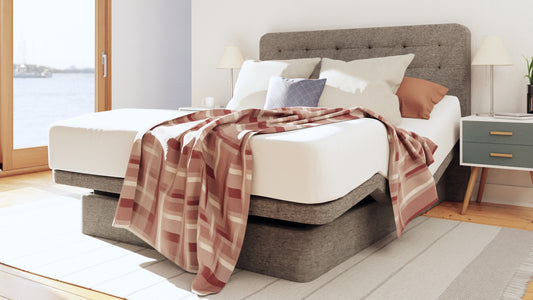Insomnia is a common sleep disorder in the United States, with long-term insomnia affecting 1 in 10 adults and short-term insomnia affecting nearly 1 in 3 adults. Insomnia is the inability to fall asleep or stay asleep throughout the night, despite having adequate time allotted to sleep, a quiet bedroom, and a comfortable bed to sleep in at night. Sleep deprivation can seriously affect your health, leading to excessive daytime sleepiness, irritability, fatigue, and even driving impairment. Common causes of insomnia are stress, anxiety, depression, pain, age, medications, and irregular sleep schedules. And these factors, or a combination of factors, can start or even worsen your lack of quality sleep.
Is All Insomnia the Same?
According to the Centers for Disease Control, up to 70 million Americans experience some degree of insomnia. But no two people experience insomnia in the same way. Often individuals experience two main types of insomniac behaviors: inability to fall asleep when you are ready to, or struggle to stay asleep (waking up multiple times throughout the night). You can even experience both issues in a single night. And further, these behaviors can happen over a brief period, one to several days or a couple of weeks, as in short-term (acute) insomnia, or play out for months, as in long-term (chronic) insomnia. Since the underlying causes may vary, your sleep patterns may also come and go or change at some point.
Insomnia and Stress
Stress and insomnia often go hand-in-hand. Stress-induced insomnia is where elevated stress levels don’t allow you to get a quality night’s sleep. You may be stressed about work, finances, school, relationships, or a significant life event like a divorce, death, major illness, injury, or a move. These stressors can profoundly affect your ability to sleep, and persistent stress can lead to chronic insomnia. If you are stressed out, being overly tired does not help solve the situation causing your stress, creating a vicious cycle. And dealing with insomnia, in and of itself, can lead to more stress. But to keep your stress at bay often requires that elusive seven to nine hours of sleep we need each night.
Insomnia and Irregular Sleep Schedules
A misaligned internal body clock and sleep schedule can lead to poor sleep quality. Ideally, we should keep to a daily sleep pattern of going to bed at the same time every night and waking at the same time in the morning to keep our circadian rhythm on track. But our sleep schedules do not always allow for this regularity. Jet lag or staying up later than usual can easily disturb our sleep patterns—asking our body to sleep at a different time than our body clock expects. Overnight shifts and inconsistent sleep schedules due to work can be particularly difficult—working through the night and sleeping during the day—contradicting our natural body clock. Sleeping with a partner who has difficulty with restless sleep can also have an affect on your sleep. Over time, this misalignment has been linked to chronic health problems like depression, obesity, and other sleep disorders.
Insomnia and Mental Health Disorders
Research has found a close relationship between the amount of sleep you get and mental health. And again, that vicious cycle strikes: living with a mental health condition, like bipolar disorder, schizophrenia, ADHD, depression, or anxiety, can affect how well you sleep, but poor sleep can negatively impact your mental and physical health. Sleep problems can create a circle of frustration, negative thoughts, and stress that slows recovery, worsens symptoms, lessens response to treatment, and puts one at risk of relapse or a greater risk of suicide in people with depression.
Insomnia, Physical Illness, and Pain
The nature of the illness or pain can affect sleep differently. Sometimes the pain will flare at night due to an uncomfortable sleep position, like sleeping on your side with hip, knee, or shoulder pain. The noise in a hospital or an uncomfortable bed can lead to waking throughout the night. Medications to address the pain can cause interrupted sleep. Pain and illness can be accompanied by stress and anxiety that lead to poor sleep. Some people with chronic pain also experience sleep disorders, like restless leg syndrome or sleep apnea. These medical conditions may mean you sleep fitfully and switch sleeping positions throughout the night to get comfortable. An adjustable bed can help you easily adjust your sleep positions on your own for a more restful night of sleep.
Insomnia and Medications
Sleep issues and insomnia can be the side effects of medication from OTC cold medicines to antidepressants, cancer treatments, dietary supplements, and blood pressure medication—making it difficult to fall and/or stay asleep. Other medications can cause drowsiness, so patients nap during the day, throwing off their circadian rhythms. Or withdrawal from certain medications can cause difficulty sleeping. If you are experiencing these effects, consult with your physician before making any changes.
Insomnia and Neurological Problems
Some sleep disorders occur in coordination with neurological conditions like neurodegenerative diseases, stroke, and epilepsy. Neurodegenerative diseases, such as Alzheimer’s and other forms of dementia, can disrupt an individual’s perception of daily cues, like when to bed and wake. They can become more agitated at night due to sundowning and confusion, adding to poor sleep quality. Recent studies have shown people who get less than the optimal amount of sleep may be twice as likely to develop dementia. And sleep problems are common in people with an autism spectrum disorder. A neurologist specializing in diagnosing and treating neurological disorders can help recognize the symptoms of possible sleeping disorders.
Insomnia and Specific Sleep Disorders
There are a few specific sleep disorders that cause insomnia. Sleep apnea causes interruptions in sleep due to lapses in breathing, not only causing sleeping problems but often daytime sleepiness. Another sleep disruptor is restless leg syndrome which creates discomfort and urges to move or jerk your legs, so you frequently wake at night. Narcolepsy affects the control of wakefulness and sleep, and individuals can experience sudden, uncontrolled episodes of falling asleep at any time of the day. Other sleep issues include sleepwalking, sleep paralysis, and nightmares that can wake you suddenly during the night.
What Are the Causes of Insomnia in the Elderly?
Many older adults complain about their quality of sleep because they tend to wake up throughout the night due to disturbances, like needing to use the bathroom, experiencing pain, feeling the side effects of multiple medications, and even loneliness can add to their stress levels. Research shows that seniors have less sleep efficiency, spending less time in deep sleep, so they wake more easily from light, noise, and heat. Many older adults attribute a lack of sleep to negatively impacting their quality of life.
What Are the Causes of Adolescent Insomnia in Teens?
Most teens do not get the sleep they need regularly and often fight a daily battle against sleepiness. Teens are at an important stage of their development and growth. They need ample rest to be more alert and less irritable. But biological changes, busy schedules, social commitments, and poor sleep habits with electronic devices in bed are all factors that contribute to a high rate of adolescent insomnia. Being tired can make this stage of life feel harder than it already does for many teens.
What Are the Causes of Insomnia During Pregnancy?
The discomfort associated with pregnancy can affect a woman’s comfort in bed as they may not be able to physically find a good sleeping position due to difficulty breathing, increased snoring, gastroesophageal reflux, and weight gain. Many soon-to-be mothers complain of sleeping more hours during the night but overall, their quality of sleep decreases. And most experience significant sleep problems during the third trimester.
How to Get Better Sleep
You may feel like a lot is working against you to get a good night’s sleep. But that doesn’t need to be the case. Follow these healthy sleep habits and tips to encourage better sleep and avoid insomnia.
Establish a sleep schedule. Try to go to bed and wake up at the same time every day. Being consistent, and creating a sleep routine, including on weekends, will maintain your sleep-wake cycle.
Pay attention to your diet. Plan your meals and keep to a healthy, balanced diet. Allow enough time for your food to digest before bedtime. Also, be aware that caffeine and alcohol can disrupt your sleep.
Relax in a comfortable bed. As the main feature of a bedroom, this is where you should invest. With age, you may find comfort in the functionality and health sensors of an adjustable bed, like the Dawn House holistic sleep system, which provides a snapshot of your health every night with a 30-day trial and free white glove delivery. And don’t forget to finish your bed with fine sheets, textured bedding, and a down comforter.
Exercise regularly. Simply put, physical activity promotes better sleep. Also, fresh air and spending time outdoors can be restorative. If the weather is good, add a walk or easy jog to your day.
Manage stress. Meditation or yoga can be relaxing tools to calm the mind. Manage stress by keeping organized, addressing priorities, and delegating tasks. And learn to say no if your plate is full.
See your doctor. Everyone experiences bouts of fitful sleep on occasion. However, if you are experiencing chronic insomnia, speak with your primary care physician to find the root of the problem and determine the appropriate next steps. Treatments are available.
Quality sleep touches every aspect of your health, both physically and mentally. Making sleep a priority in your life can restore your brain and body at night for better health, happiness, and quality of life.


